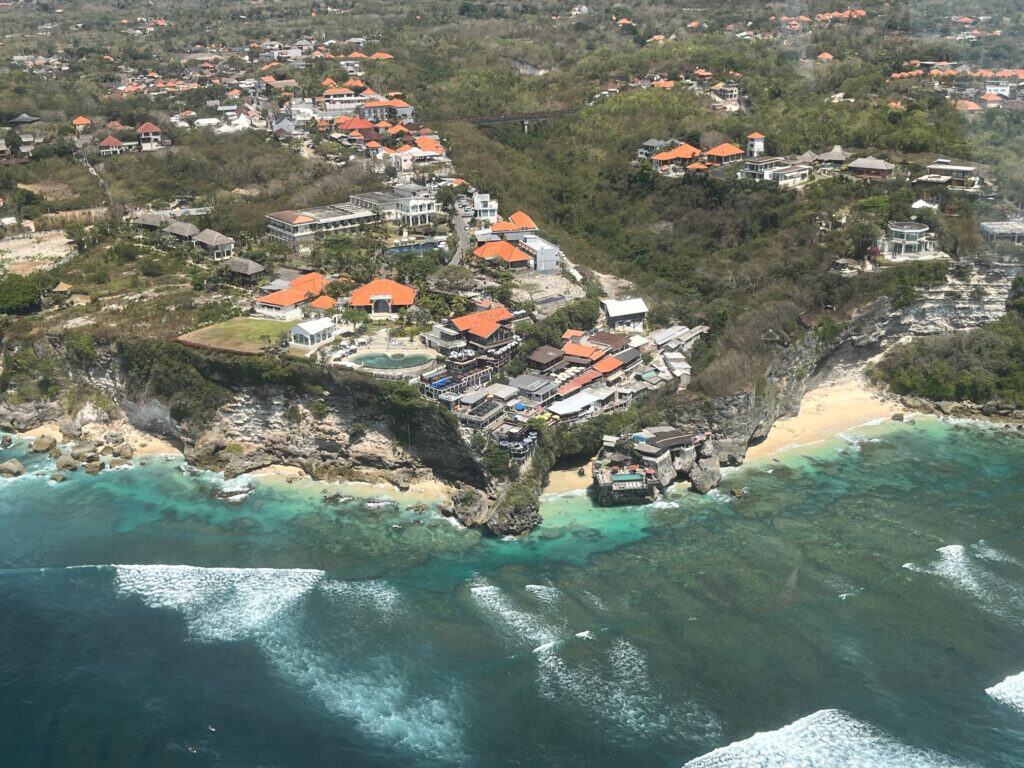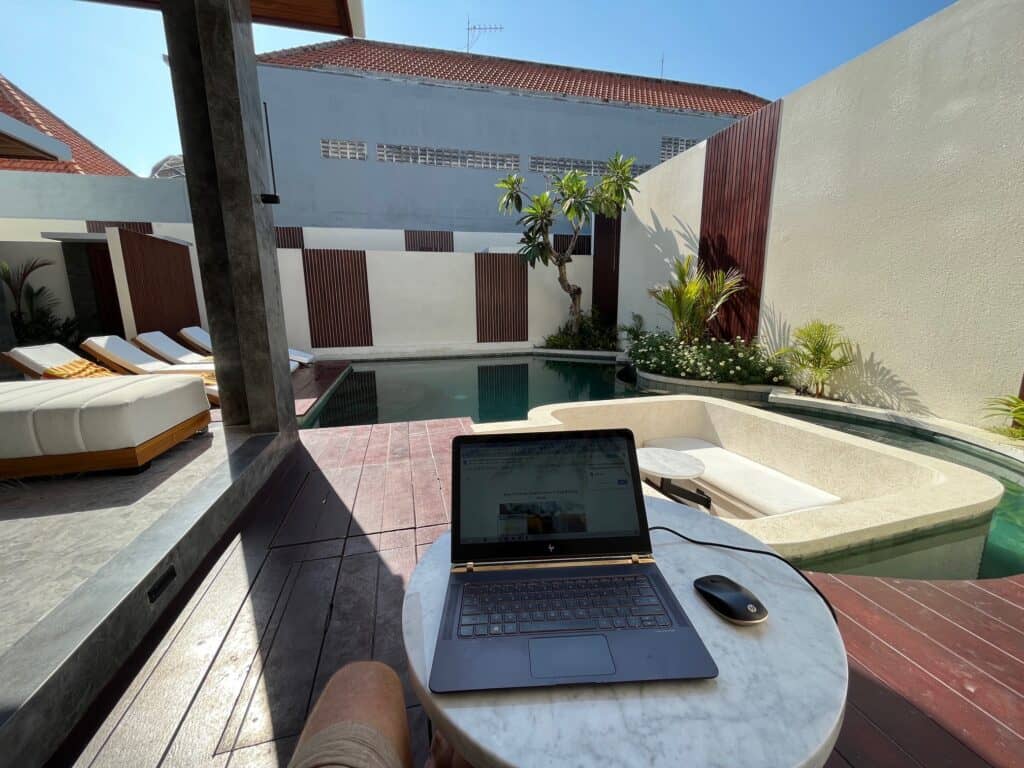Have you ever wanted to break free from the rat race? Of course you have – who doesn’t?
Now, imagine living and working in a tropical paradise. A place of vibrant rainforests, beautiful white sand beaches, clear water, and endless sunshine. A place where, for all its many advantages, the cost of living is many times cheaper than what you’re probably used to at home.
Whether you know it or not, you’re picturing Bali. You can live in Bali.
Bali has become an absolute magnet for digital nomads who have found a way to work from anywhere in the world. This Indonesian island is one of the most popular destinations in Asia for digital nomads, with thousands of people coming to live and work on the island every year.
But before you start packing your flip-flops and your laptop, there are a few things you need to know about living and working in Bali as a Digital Nomad. Let’s take a look at what it takes to make this beautiful island your home.

Legal Requirements for Digital Nomads in Bali
Visa Options
First things first – as with just about any country on earth, you can’t simply show up at the airport and announce your intention to begin a new life in Indonesia. While it’s relatively simple to get a 30 day tourist visa on arrival for residents of 90+ countries, a tourist visa does not allow you to work.
If you’re planning to make a living in Bali, there are two different visas you need to know about:
C-Type Visa 211A
This is the visa you will need if you aren’t from one of the 90 countries that can apply for visas on arrival or an ASEAN country (basically another country in Southeast Asia). But it’s also a good visa if you intend to work. This visa allows you to stay in Indonesia for 60 days, and can be renewed twice without leaving the country for a maximum stay of 180 days. Note that if you leave Indonesia before your visa expires, you will be considered to have forfeited your remaining days in the country and will not be allowed back in.
E33G Remote Worker Visa
Because of the demand from digital nomads, Indonesia has introduced this specialized visa specifically aimed at people who work remotely. The visa is good for one year, and you can apply online. Note that you have to enter Indonesia with this visa, so you’ll need to apply before you get there.
It’s also very important to remember that this visa is only for remote workers, and does NOT allow you to work for an Indonesian company. That means no teaching yoga, no giving surf lessons, no driving a taxi, or anything like that. This visa is only intended for those who work for companies outside of Indonesia, and if you make money in Bali in any way, you will be in violation of your visa conditions.
Indonesia also offers a range of different visas for people in different professions. For example, you might be a Digital Expert, qualified for an E24 visa. Or maybe you’re an artist, eligible for an E23R. The government website has a helpful tool that can guide you toward the correct kind of visa for you. The important thing is to be 100% honest and make sure you get a visa that suits your needs. For most digital nomads, that’s going to be the E33G.
If you want to stay longer, it’s possible to transition a 211A visa into a KITAS, which is a long-term residency permit good for five or ten years. However, this comes with some fairly onerous conditions, including the obligation to deposit US$130,000 into an Indonesian bank. For that reason, it’s suitable only for people who intend to make Bali their permanent home.
Benefits to Live in Bali
If you’re wondering if it’s worth the hassle to apply for a visa, let’s look at why Bali is such a popular destination for digital nomads.
- Cost of Living: Although it’s not nearly as cheap as some lesser-known places in Indonesia and across Southeast Asia, Bali offers an affordable cost of living compared to Western countries. Accommodation, food, and transport are relatively inexpensive, making it an attractive destination for digital nomads. A meal in a cheap restaurant can cost less than US$3, and a monthly transit pass is less than US$10.
- Quality of Life: The island boasts stunning beaches, vibrant nightlife, and tons of outdoor activities. The warm climate and friendly locals add to the overall appeal.
- Community and Networking: Bali has a thriving community of digital nomads, with numerous co-working spaces and networking events. This makes it easy to meet like-minded individuals and form professional connections. English is widely spoken on the island, which can also make it easier to start a new life.
- Cultural Richness: Bali’s rich cultural heritage offers a unique living experience. Traditional ceremonies, art, and local cuisine provide a deep dive into Indonesian culture. Living in Bali is nothing like living in North America or Europe, where many digital nomads come from, and isn’t that why you want to live somewhere different? To see something new?
- Infrastructure: As one of the more developed islands in Indonesia, Bali offers high Internet speeds, including fiber-optic connections ideal for people who work online.

Live in Bali: Accommodation Options
Short-term Living: House Rentals
For digital nomads planning a short-term stay, house rentals are usually a good choice. Websites like Airbnb, Booking.com, and local real estate agencies offer a wide range of villas, apartments, and guest houses.
- Villas: Private villas are abundant in Bali, offering luxury and privacy. They often come with pools, gardens, and housekeeping services.
- Apartments: For a more urban experience, apartments in areas like Seminyak and Canggu provide modern amenities and proximity to cafes and co-working spaces.
- Guest Houses: Affordable and locally operated, guest houses are a great way to experience Balinese hospitality.
Be warned, though, that Bali is hardly a closely-guarded secret. The word is definitely out on this beautiful island, and so you’ll find prices for accommodation surprisingly high compared to other Southeast Asian countries – or even other parts of Indonesia.
For example, the average cost for a two-bedroom apartment in Bali is around US$100 per night, while in Jakarta, it’s closer to the US$30-US$40 range. Still, if you’re booking for longer, you can often get better deals. US$1000 per month may be enough to get you a small villa with a pool in somewhere like Kuta, and if you’re willing to stay somewhere more remote, you can find a place to stay for even less.
Long-term Living: Buying Property
Buying property in Bali isn’t a simple matter of showing up with a suitcase full of money. There are various legal considerations you need to know about before you start shopping for a home.
The most important thing to know is that the highest level of property ownership, called Hak Milik, is only available to Indonesian nationals. That doesn’t mean foreigners can’t own property in Indonesia, but it does mean you may have to go through some complex steps to do it.
- Leasehold Agreements: Foreigners can lease land for up to 80 years. Once the lease term is up, though, the property reverts to its previous owner, meaning you won’t be leaving it to family.
- Nominee Arrangements: Involves an Indonesian citizen holding the title on behalf of the foreigner, though this comes with legal complexities and risks. If the Indonesian government find out you’re using an Indonesian national to get around the rules, they can confiscate the property.
- Right to Build (Hak Guna Bangunan): Allows foreigners to build on leased land with rights that can be renewed every 30 years.
- Start a company: Foreign companies are allowed to own land in Bali through what’s called a PT PMA. You’ll have to register the company in Indonesia, and you’ll need a big chunk of cash. Indonesia demands that foreign investors must have the intention of investing at least US$610,000, and you’ll to be able to prove a minimum of 25% of that sum to get your company off the ground.

Popular Locations for Digital Nomads
Once you’ve got your visa, it’s time to think about where you want to live in Bali. The island is not a monolith, and different areas offer different experiences for digital nomads. Here are some of the main areas you may want to consider living in:
Sanur
Pros:
- Peaceful Environment: Sanur is known for its laid-back vibe and quieter beaches, making it ideal for those who prefer a more relaxed lifestyle.
- Accessibility: Located close to Denpasar, the island’s capital, and Ngurah Rai International Airport.
- Amenities: Plenty of cafes, restaurants, and co-working spaces cater to digital nomads.
Cons:
- Nightlife: Limited nightlife options compared to other areas like Kuta and Seminyak.
- Younger Crowd: Less popular among younger digital nomads who prefer a more vibrant scene.
Kuta
Pros:
- Vibrant Lifestyle: Kuta is famous for its bustling nightlife, shopping, and entertainment options.
- Beach Life: Excellent for surfing and beach activities.
- Connectivity: Well-connected by public transport and close to the airport.
Cons:
- Crowded: Kuta can be overcrowded, especially during peak tourist seasons.
- Noise: The area is noisy and might not be suitable for those seeking a quieter environment.
Nusa Dua
Pros:
- Luxury Living: Nusa Dua is home to high-end resorts and pristine beaches, so you can have a a luxurious living experience.
- Safety: Known for its well-maintained and secure environment.
- Relaxation: Ideal for those seeking tranquility and high-quality amenities.
Cons:
- Cost: Higher cost of living compared to other parts of Bali.
- Community: Less of a digital nomad community compared to places like Canggu or Ubud.
Healthcare
Bali has several international standard hospitals and clinics. Bali even has a brand-new International Hospital in Sanur which can provide treatment in English and a variety of languages.
Like most countries, Indonesia offers a national healthcare system, but even if you’re outside the system, you’ll find the cost of health treatment very reasonable – especially if you’re from the US. However, it’s always a good idea to make sure you have comprehensive healthcare that covers you no matter what happens.
Transportation
Getting around Bali is relatively easy:
- Scooters: The most popular mode of transport. Renting a scooter is affordable and convenient.
- Taxis and Ride-sharing: Services like Gojek and Grab offer reliable and inexpensive options.

Culture
In general, Balinese culture is warm and welcoming. Locals accept that their island is immensely popular with foreign visitors, and there is little friction between Balinese residents and digital nomads.
However, whenever you’re in a foreign country, it’s important to never forget that you are not at home, even if it sometimes feels like it. Bali is majority Hindu, but Indonesia is a Muslim country, and although the laws are generally more permissive than in most Muslim countries, it’s important to understand that there are certain cultural standards you need to respect.
Take the example of the Russian influencer who was arrested and deported for photographing herself naked in front of a sacred tree. Or the American digital nomad who described Bali as ‘queer friendly’ and encouraged other Americans to move there during the Covid 19 pandemic, and was subsequently deported.
Bali can sometimes feel like a tropical playground with a laid-back lifestyle where anything goes, but that’s not fair to the local culture. Respect local traditions and ways of doing things, and you will be welcomed with a smile.
Being a Digital Nomad in Bali
There’s no question that you can live in Bali and have a great life. If you love to swim, snorkel, dive, or surf, you’ll have endless beaches to explore. If you’re more of a hiker, there are mountains to climb and forests to wander through. If you’d rather immerse yourself in the unique culture of this part of Indonesia, you’ll find plenty of temples and spiritual sites to be inspired by. And if you want to party with other travellers from around the world, there are few better places to do it than here.
Plus, although Bali is not the bargain it once was, you can probably still live cheaper here than you do at home, especially if you come from North America or Western Europe. That can make Bali the ideal place to explore the digital nomad lifestyle and live cheaper while you find ways to make money online.
But before you start booking your ticket, make sure you understand the legal and social complications that can arise from moving to this beautiful place. With the right information, you can prepare yourself for any difficulties you may face and make sure your new life of being a digital nomad in Bali starts the right way.



